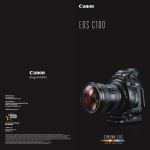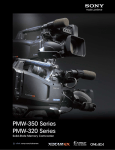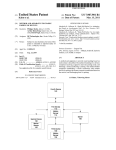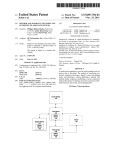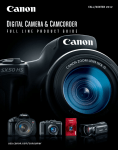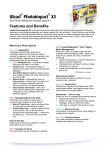Download Canon EOS-1D C Family Brochure
Transcript
Leave no story untold As a Filmmaker, the world truly is your stage. There's no limit to your creative vision — or Where your story can take you. And With The Canon Cinema EOS system of cameras and lenses, You can shoot anything, at every level of production. Go Wherever the story takes you It is our pleasure to present the four cameras that comprise the Cinema EOS System: the EOS C500 4K Digital Cinema Camera; the EOS-1D C 4K DSLR Cinema Camera; the EOS C300 Digital Cinema Camera; and the EOS C100 Digital Video Camera. Each camera offers superb image performance and outstanding operational features and benefits. They are innovative, digitally and physically robust, and backed by Canon’s legendary high-quality craftsmanship. Indeed, these are the cinema cameras that let you go wherever the story takes you. EOS C100 Digital Video Camera EOS C300 Digital Cinema Camera EOS C500 4K Digital Cinema Camera EOS-1D C 4K DSLR Cinema Camera The Contents The Professionals The Projects Capturing the Story....................... 10 Man & Beast 4K short film Shot with the EOS C500 Exceptional Quality . . ..................... 16 The Ticket Canon Cinema & EF Lenses 4K short film Shot with the EOS-1D C Canon Image Quality Multiple Recording Formats Canon 4K/2K Workflow Open Heart Shane Hurlbut, ASC Jeff Cronenweth, ASC Peter Simonite Director of Photography of The Ticket Director of Photography of Man & Beast Cinematographer of Bart 2nd Unit Director of Photography of Man & Beast On the Set Freely ......................... 30 Documentary film Shot with the EOS C300 Die in New Orleans Music video Shot with the EOS C300 Flexible, Durable, Reliable ........... 34 Afghanistan Documentary Documentary film Shot with the EOS C300 Fit Any Production Needs/Budget Control Surviving the Peace Documentary film Shot with the EOS C300 Unleashing the Vision .................. 46 Post-Production Service, Support and Education ..... 52 Dante Ariola Vincent Laforet Sam Nicholson, ASC Director of Man & Beast Director of Mobius Director of XXIT Mobius Short film Shot with the EOS C300 XXIT Service & Support Short film Shot with the EOS C300 Educational Resources Max is Back Short film Shot with the EOS C300 Canon Cinema EOS System .......... 58 Pulse Documentary short film Shot with the EOS C100 Kief Davidson James Longley Rick Gershon Director of Open Heart Director / Cinematographer of Afghanistan Documentary Director / Cinematographer of Surviving the Peace Bart Short film Shot with the EOS C100 For additional content Using the Digimarc® Discover app, shoot the pictures with icons to reveal extra content on your mobile device. See page 66 for details on how to download and use the app. EOS C100 Digital Video Camera EOS C300 Digital Cinema Camera EOS C500 4K Digital Cinema Camera EOS-1D C 4K DSLR Cinema Camera Movie of the Behind the Scenes BTS FILM BTS Movie of the Film/ Trailer FILM BTS FILM Product Information Capturing the story The greatest stories demand to be told without compromise. That’s why Canon Cinema EOS cameras make sure you have everything you need – exceptional quality, adaptability, reliability, versatility and support – to tell your story. Finally, instruments worthy of your limitless creativity. EOS C500 on the set of the 4K short film “Man & Beast” 9 10 EOS-1D C on the set of the 4K short film “The Ticket” Pictured here: Shane Hurlbut, ASC BTS FILM “How much can I push the envelope, what are my boundaries on this journey? With the C500, I really had nothing to stop me from presenting those images in the fullest dramatic way I could.” Jeff Cronenweth, ASC / Director of Photography EOS C300 on the documentary “Surviving the Peace” Behind the scenes location footage shot by Rick Gershon and Nathan Golon BTS FILM “The sky is no longer the limit, it’s the stratosphere. This is an A camera system, and it can be as big or small as you want to make it. When you can take a camera system – put it in the right place, the right moment – that gives you the best talent, the best expression, the best emotions, and the best performance... My job is done!” Shane Hurlbut, ASC / Cinematographer BTS FILM Behind the scenes of the 4K short film “Man & Beast” Pictured here: Dante Ariola and Peter Simonite 11 EOS C500 on the set of the 4K short film “Man & Beast” Pictured here: Jeff Cronenweth, ASC 12 “ When cameras like this are put in the hands of storytellers who can be concerned with what’s going on in the moment and no longer concerned with what’s going on in the technical needs of just operating a camera, the future is going to be very powerful.” EOS C100 on the documentary short film “Pulse” Grant Peelle / Stillmotion Filmmaker EOS C300 on the set of the music video “Die In New Orleans” Pictured here: Rick Kaplan Photographed by Danielle Moir BTS FILM “As filmmakers and directors and producers, our job is to tell stories. We need a tool that does all the things that we can do and we kind of need for them to get out of our way to let us do it. And that’s exactly what the C300 does. It’s real simple to use; it gives you a great quality picture. It’s the camera of the future.” Rick Kaplan / Director BTS FILM EOS C300 on a documentary based on Afghanistan Pictured here: James Longley BTS 13 FILM 14 Exceptional Quality Canon digital cinema cameras produce quality that is so cinematic, so natural – so compelling. With superb tonal reproduction, brilliant color reproduction and comprehensive image adjustment, your audience will see exactly what you want them to see. “We’ve got some close-ups with the actor and because of the 4K, you can see the different colors of the pores on his skin. I was blown away by the look of this camera. It does not look digital, it has a very filmic quality.” Allan Schollnick / Post-Production BTS FILM Frame grab from the 4K short film “The Ticket,” shot with the EOS-1D C 15 16 EOS-1D C on the set of the 4K short film “The Ticket” Frame grab from the 4K short film “The Ticket,” shot with the EOS-1D C BTS FILM Frame grab from the 4K short film “Man & Beast,” shot with the EOS C500 “The Canon Log manages to do tonal compression so that when I need to get information out of the highlights or out of the shadows I can actually dig that out.” “It’s really great to have a sensor that has 4K resolution and that has a dynamic range of 12 stops. It retains every piece of detail from highlight to shadows – it’s beautiful.” David Cole / Senior Colorist of Technicolor Peter Simonite / Director of Photography 17 18 “In both the documentary portions that are going to be run-and-gun minimal lighting, and in the produced portions where we spent a lot more time and a lot more lights to set up – we got a really, really strong image. Not a lot of cameras can do that. They often are suited to one scenario or another. The C100 really excelled in both and that was really impressive.” Patrick Moreau / Stillmotion Filmmaker BTS FILM Images on this page: Frame grabs from the documentary short “Open Heart,” shot with the EOS C300 BTS BTS FILM Frame grab from the documentary “Pulse,” shot with the EOS C100 FILM “T here was one particular scene we were going to get... at midnight—we’d have no access to lights. We were filming this at 10000 ISO and there’s virtually no noise, and I was absolutely floored by what the C300 could do in a low-light situation. I don’t think any other camera could have actually given us that shot with zero lights.” Kief Davidson / Director, Cinematographer “Open Heart” 2013 Academy Award® Nominee, Documentary Short 19 EOS C100 on the documentary “Pulse” 20 Canon CINEMA & EF LENSES Capitalizing on decades of know-how while developing some of the world’s most advanced optical systems, Canon lenses are renowned for their accuracy, clarity and optical brilliance. They bring fresh perspective to your vision and stimulate your creativity. This is a lens system whose standard is measured by the professionals out in the field – day in and day out. Canon Cinema Lenses Designed exclusively for cinematography, Canon Cinema Lenses are engineered to exceed the standards of working professionals. Every lens fulfills contemporary 4K production standards, surpassing the performance requirements of any HD imaging system. 11-blade aperture diaphragms help ensure beautiful bokeh, while geared inner focusing dramatically helps minimize focus-induced changes in the angle of view and greatly reduces focus breathing. Select lenses utilize special glass elements, such as fluorite and aspherical features, to maximize the optical performance brought by Canon’s advanced design technique. Cinema Zoom and Compact Zoom Lenses: Highlights 21 Canon EF Lenses Canon Cinema Prime Lenses offer high optical speed, produce exceptionally sharp 4K images and superb contrast, and maintain tightly controlled geometric distortion. Low T-numbers enable better low-light shooting and enhanced image expression with shallow depth-of-field. Canon Cinema Zoom and Compact Zoom Lenses feature new optical glass materials, new optical coatings and powerful new design techniques for advanced optical performance. Perfected in Canon laboratories and proven in the field, Canon EF Lenses incorporate a rare array of the world’s most advanced optical, micro-electric and manufacturing technologies. Many lenses use Canon’s advanced Peripheral Illumination Correction feature, thereby rendering beautiful, consistent color and brightness across the image plane. Select lenses employ Optical Image Stabilizer technology, which helps to reduce motion blur by counteracting camera shake. All Cinema Lenses: Highlights Cinema Prime Lenses: Highlights Brilliant Sharpness of 4K Consistent Picture Qualities Attractive Bokeh Each Canon Cinema Lens provides outstanding optical performance that is designed to fulfill contemporary 4K production standards. All Canon Cinema Lenses are designed to match in terms of picture quality, maximizing your freedom to mix lenses according to various shooting situations. 11-blade circular aperture provides soft, beautiful background bokeh that is consistent throughout the lines. Compatibility with Super 35mm Cameras Ready for Full-size 35mm Sensors The lenses are compatible with industry-standard Super 35mm cameras and APS-C cameras. (The compact zooms are compatible with larger 31.4mm sensors.) The lenses are compatible with the large imaging area of cameras equipped with a full-size 35mm-equivalent CMOS sensor. Suppressed Temperature-induced Changes Very Fast Aperture Temperature-induced marking discrepancies are virtually eliminated by utilizing special glasses effectively. Enables shooting with shallow depth-of-field and low-light capability. Maximized Optical Performance Minimized Focus Breathing Placing special optical glass materials, such as UD glass and fluorite, in the most effective configurations reduces chromatic aberration, ghosting and flare. Advanced design technique and Canon know-how enable lenses with minimal focus-induced changes in the angle of view. 22 Canon image quality At the heart of each Cinema EOS camera is a remarkable Canon CMOS sensor. These sensors help ensure cinematic shallow depth-of-field imagery, excellent low-light sensitivity and high signal-to-noise ratio. The addition of Canon Log Gamma ensures that you capture a wide, filmic, high dynamic range without sacrificing broadcast workflow, while high-speed ≥ Image Processors help ensure excellent tonal and color reproduction across a wide ISO sensitivity range. Canon Super 35mm CMOS Image Sensor Canon CMOS Sensor Signal Processing Canon Large Format CMOS Sensors Canon ≥ Image Processing Canon Log Gamma Wide Dynamic Range with Low Signal-to-noise Designed from the ground up to specifically meet the cinema industry’s motion-imaging needs, the EOS C500, EOS C300 and EOS C100 digital cameras feature Super 35mm, 8.3 Megapixel CMOS sensors that offer the type of outstanding image-performance characteristics demanded by professional cinematographers. The EOS-1D C digital camera’s unique 18.1 Megapixel Full-Frame CMOS sensor provides excellent signal-to-noise ratios and ISO sensitivity, allowing great detail in deeply shadowed scenes while preserving finer detail in more exposed areas of the frame. The EOS C500, EOS C300 and EOS C100 digital cameras feature Canon’s specially developed ≥ DV III Image Processors for in-camera component video processing. These processors’ highly sophisticated and proprietary architecture support flexible control over a wide range of video-image parameters that empower creative choices on the set. The EOS C500 includes special, high-speed processing to prepare and structure the 4K RGB Bayer RAW and 2K RGB RAW video formats for delivery via 3G-SDI outputs to external recorders. Dual ≥5+ Image Processors within the EOS-1D C embody superb video-data handling, which includes refined algorithms to reduce noise at high ISO speeds. Canon Log Gamma lets Cinema EOS cameras record the maximum dynamic range delivered by their respective image sensors. The Log Gamma Curve is implemented at a high bit depth and then downconverted, recording the output data using Canon’s 8-bit 4:2:2 XF Codec. The curve facilitates post-production processes that seek to restore the image sensor’s linear light-transfer characteristics; the resultant data files are ideal for advanced post-production processes that require excellent tonal and color reproduction. Cinema EOS cameras offer outstanding low-light sensitivity. Noise is kept remarkably under control, possessing a subjective, pleasing, film-like texture pattern devoid of the fixed-pattern noise that traditionally has been the nemesis of digital cameras. Excellent signal-to-noise ratios help ensure that all of the ISO settings offered by each camera are eminently suitable for digital cinematography. Canon ≥ DV III Image Processor Canon Super 35mm CMOS Image Sensor Helps ensure tonal reproduction for both highlight and lowlight regions during postproduction. Signal processing superior to that in a 3-chip RGB system OUTPUT 2160 Normal 1 Canon Log 3840 1080 Shown at actual size: 24.6mm x 13.8mm INPUT 1920 Frame grab from the Sam Nicholson, A.S.C. film “XXIT,” shot in Canon Log mode 23 Frame grab after color grading 24 MULTIPLE RECORDING FORMATS For added flexibility both on the set and during post-production, Canon Cinema EOS cameras offer multiple recording options to both in-camera and external media. The EOS C500, EOS C300, and EOS C100 digital cameras all support 8-bit HD in-camera image acquisition. The EOS C500 extends this to a choice of 2K or HD external recording at either 12-bit or 10-bit RGB 4:4:4, with an additional powerful creative option of 4K capture at high frame rates. The EOS-1D C supports in-camera 4K at 24 fps capture, or HD capture at up to 60 fps. 4K Acquisition For both cinematic and HD-video productions, the 4K mode of operation offers significantly enhanced image quality. The EOS C500 offers a choice of 4096x2160 format for motion picture production or 3840x2160 format for television production. Uniquely, the EOS C500 structures its RAW file as a multiplex of four separate 2K components for external recording, with full retention of all 4K color-coded information. Format 2K Acquisition The EOS-1D C also offers 4K acquisition – as in-camera recording of 4:2:2 YUV video at 24 fps using a Motion-JPEG intra-frame codec. This unique camera further offers alternative high definition video capture – with a choice of a Super Crop 35mm mode (when using cine zoom lenses) at frame rates of 24/25/30P, or a Full Wide HD (when using cine prime lenses or standard EF lenses) at frame rates of 24/25/30/50/60P. All four Cinema EOS cameras support high-quality HD acquisition at all of the internationally standardized frame rates. The EOS C500, EOS C300, and EOS C100 cameras originate RGB video components by direct parallel readout from their Super 35mm CMOS image sensor – thus avoiding any debayering processes. All cameras record this HD signal in-camera while also offering external, uncompressed 4:2:2 HD via HD SDI ports (for the EOS C500 and EOS C300) and via HDMI for the EOS C100. The EOS C500 offers a choice between HD (1920x1080) and 2K (2048x1080) RGB 4:4:4 at 12- or 10-bit, at frame rates up to 60P for external recording. Switching to 10-bit YUV 4:2:2 allows the HD or 2K components to operate as high as 120 fps. Recording Media 4K/2K/HD Cinema Raw External Recorder MXF HD MPEG-2 4:2:2 50 Mbps CF Cards MXF HD File-based Workflow 4K @ 24p 4:2:2 Motion-JPEG / HD 4:2:0 AVC H.264 CF Cards 4K Motion-JPEG Workflow / HD AVC H.264 Workflow HD 4:2:2 Uncompressed External Recorder (via HDMI) MXF HD MPEG-2 4:2:2 50 Mbps CF Cards HD 4:2:2 Uncompressed External Recorder (via HD SDI ) 4:2:0 HD AVCHD SDHC Cards HD 4:2:2 Uncompressed External Recorder (via HDMI) 4K/2K Workflow HD Workflow MXF HD File-based Workflow HD Workflow AVCHD File-based Workflow HD Workflow EOS C500 26 27 Canon 4K/2K workflow 4K Workflow Because of the large amounts of image data involved, 4K workflow is normally determined by the choice of external digital recorder, and thus that recorder’s data management strategies. The unique, four-component Canon RGB Bayer RAW and Half RAW signals (at half the vertical resolution) carry the 4K-coded color information via SMPTE-standardized 3G-SDI recorder interfaces for ready ingest to data servers and media management workstations. Canon’s Cinema RAW Development (CRD) software debayers 4K files and converts Production-to-post workflows vary with choices of 2K/HD or 4K acquisition, in-camera versus external recording, as well as the production application – such as moviemaking or TV production. Workflows can also be dependent upon a number of creative choices and delivery requirements. Since flexibility is the key to successful cinema and television production, Canon collaborated closely with multiple manufacturers of digital 4K/2K recorders and editing systems to help ensure full camera-to-post compatibility with seamless data transfer options. 2K Workflow the 10-bit data to RGB DPX files for direct use in post-production. Canon-supplied information on Canon Log facilitates precise conversion to linear DPX components at higher bit depths, if required. Separately, the Canon EOS-1D C’s use of the industry-standard Motion-JPEG codec for 4K motion-image capture supports high-quality post-production, with its HDMI clean-HD output facilitating convenient external recording of a proxy video to support offline editing. The EOS C500 delivers a choice of uncompressed 2K or HD RAW RGB 4:4:4 video (with Canon Log applied) via a 3G-SDI serial output to a range of digital recorders that use solid-state memory packs. Some of these data recorders directly capture the camera’s RGB 4:4:4 video, while others compress prior to recording. EOS C500 4K Production Workflow (Generic Workflow) EOS-1D C 4K / HD Production Workflow 4K RAW Recorder Develop Software Color Grading 3G-SDI EOS-1D C HDMI Output (Cinema RAW Development) CF Card Delivery EOS C500 Certain recorders use a media management station to transcode the recorded Canon files to other industry file formats – such as DPX, ProRes and Open EXR – for direct access by different grading processes. The in-camera 50 Mbps MPEG recording of a proxy video serves to support the offline editing process. Uncompressed 4:2:2 External Recorder • AJA • Codex Digital • Convergent Design CF Card (For Reference) • S. Two • Finish Astrodesign • Keisokugiken (KGC) Full HD 60p H.264 EDL Proxy File NLE Online Editing Server EOS C500 2K RGB 4:4:4 Production Workflow (Generic Workflow) External Recorder Color Grading 3G-SDI BTS EOS C500 27 EOS-1D C FILM Delivery EOS C500 4K Motion-JPEG NLE EDL Color Grading EDL CF Card (For Reference) Proxy File NLE 4K Proxy Full HD Delivery 28 On the set freely Feel free to explore environments you never imagined. Capitalize on the most challenging lighting situations. Shoot creatively in tight spaces or hard-to-reach places. And, with highly intuitive features, these cameras are ready to hit the ground running. Or use their inherent versatility to make them fit your own intuition. BTS 29 EOS C100 on the set of the short film “Bart” Pictured here: Peter Simonite FILM 30 EOS C100 on the documentary “Pulse” EOS C300 on the set of the short film “XXIT” “W hat I found as a director using this camera is because of the size and the fluidity of using it, it’s much less obtrusive with the actors. It’s like a SWAT team approach as opposed to a big army.” Sam Nicholson, ASC / Director EOS-1D C on the set of the 4K short film “The Ticket” 31 EOS C300 on the set of the short film “Mobius” 32 FLEXIBLE, DURABLE, RELIABLE Trek the desert. Plunge into a rainforest. Explore tundra. Go where you please. Cinema EOS cameras won’t complain; won’t buckle. Built strong for the harshest of conditions and dependable for the longest of projects, they won’t stop shooting until you do. “Going into the shoot, I was really nervous about not only keeping the camera safe from the heat but also keeping it clean of sand because sand is a nightmare if it gets on the lens or into the body, but I was really impressed with how the camera dealt with the high heat out there.” Polly Morgan / Director of Photography EOS C300 on the set of the short film “Mobius” 33 BTS FILM 34 BTS FILM Frame grab from the documentary “Surviving the Peace,” shot with the EOS C300 EOS C300 on the documentary “Surviving the Peace” Behind the scenes location footage shot by Rick Gershon and Nathan Golon “The reason why this camera is so great for documentary vérité shooting is that I don’t have to add a bunch of workarounds to get that look. It’s already there, it’s right out of the box, it’s built in and ready to go, which is really useful, especially in an environment that was extremely dusty, extremely hot, and just really tough to work in.” Rick Gershon / Director of Photography, MediaStorm EOS C300 on the documentary “Surviving the Peace” 35 Images on this page: EOS C500 on the set of the 4K short film “Man & Beast” 36 Fit Any Production Needs/budget Compact, Modular Design Each Cinema EOS camera features a modular, ergonomic body design that packs a lot of functionality into a remarkably small package while providing enhanced mobility and expandability. Removable top handles with built-in microphones, side-mount grips and adjustable LCD monitor panels enable custom configurations for specific, user-definable shooting styles. To help ensure full operational flexibility, Cinema EOS cameras can be configured in a number of different ways, depending on the specific needs of the project, and the target budget. Compact, lightweight magnesium-alloy bodies offer enhanced mobility for comfortable handheld or dolly-mount shoots using PL- or EF-mount lenses. Full compatibility with a range of third-party accessories further increases camera-operator comfort. EOS C300 with matte box*, follow focus* and monitor unit (*Third-party accessories) 37 Third-party Accessory Compatibility EOS C300 with monitor unit and handle EOS C300 with monitor unit High-resolution electronic viewfinders provide widescreen aspect ratios. Multiple start/stop buttons enable easy triggering regardless of how the camera is rigged. A variety of focus aids, waveforms, vectorscopes and an optional wireless file transmitter round out these truly professional camera packages. Canon has collaborated with a number of third-party vendors to help ensure full plug-and-play compatibility for Cinema EOS cameras with a range of matte boxes, flag shades, support rods and follow-focus systems, including geared control rings, marking discs and adjustment knobs that simplify the camera operator’s life. Geared control rings are a must-have for use with pitchless, stillcamera lenses; a wind-around gear mounted on the focus ring lets the chosen lens function with familiar follow-focus rigs. With such enhanced customization, cinematographers and videographers can handle a wide range of shooting scenarios. EOS C300 camera and lens only 38 Rugged, Durable, Quiet PL- or EF-Mount To integrate easily into the working style and equipment array of film crews and production houses, the Cinema EOS System offers two different camera mounts. The EOS C500 PL and EOS C300 PL feature the industry-standard PL mount and are compatible both with suitably configured Canon Cinema Zoom PL-mount lenses and the majority of third-party PL-compatible zoom and prime lenses available for 35mm motion picture cameras. The EOS C500, EOS-1D C, EOS C300 and EOS C100 digital cameras are available with a Canon EF lens mount and are compatible with Canon Cinema Zoom, Compact Zoom and Prime EF-mount lenses, as well as the vast array of Canon’s standard EF lenses, including Super Telephotos, and specialty Tilt-Shift, Macro and Fisheye – over 60 lenses in all. Electronic contacts built into EF-Mount cinema cameras and lenses enable direct communication between each device – allowing lens metadata to be displayed in the viewfinder and for the T-number and focus position to be recorded in the video file. In addition, when connected to the optional Canon Wireless File Transmitter WFT-E6A Unit, select functions can be controlled remotely – further expanding the camera’s flexibility. Designed to reliably withstand use in a range of hostile and adverse environments in the field, Cinema EOS cameras feature tight sealing for protection against dust, and provide reliable operation in both wet and cold weather conditions. Robust, splash-resistant magnesium-alloy bodies provide tough, durable strength that supports heavy lenses and accessories, while the resultant light weight and compact size enables users to obtain footage in a wide Dust-proof, Splash-proof Design Wireless Capability variety of situations. An internal cooling system with silent fans and vents keeps the camera cool even in hot conditions, drawing unwanted heat out of the camera body through vents at separate positions. An innovative graphite sheet conducts heat from the image sensor. Operation is quiet and smooth, thereby ensuring that sound recording and on-screen images remain undisturbed. Cooling System To provide unique capabilities not typically available in cinema cameras, Cinema EOS cameras connect to the optional Canon Wireless File Transmitter WFT-E6A Unit that lets users remotely control systems from up to 150 feet away over wireless networks from a PC, smartphone, tablet or similar device. You can start or stop recording, adjust white balance, gain and other parameters, and even adjust the focus and aperture of Canon EF lenses. Wireless File Transmitter WFT-E6A Unit Cooling fans Vents at three positions on the sides A highly conductive graphite sheet conducts sensor heat towards the heat sink. Additionally, cooling fans on top force hot air in the body away from vents and out through exhaust openings. WFT-E6A Sealed areas EOS C300 PL with PL mount 39 EOS C300 with EF mount 40 CONTROL The history of motion picture film production has shaped camera systems to offer easy usability, in addition to high precision. For lenses, a tactile interface with the ability to manipulate critical operational controls such as focus, iris and zoom helps accomplish this goal. For digital cine cameras, which feature numerous electronic controls that empower creative intervention during shooting, detachable grips and assignable buttons let cinematographers shape their own ergonomics. Cinema Zoom and Compact Zoom Lenses: Highlights Light, Compact Cinema Lens Gearing and Control Camera Ergonomics with Customizable Buttons Canon Cinema lenses meet cinematographers’ highest expectations of control over focus, iris and zoom. Wide rotation angles – especially on focus controls – combine with large, highly visible scales, high mechanical accuracy of each control, and a carefully implemented tactile resistance that augments operational precision. A unique optical design that significantly minimizes focus breathing facilitates a new level of creative focus pulls. The Cinema Zoom lenses’ associated three gears are precisely matched in location and diameter to facilitate convenient lens exchange during a shoot. The same is true for the Cinema Compact Zoom lens series, and for the series of Cinema Prime lenses. For added convenience, Canon EOS cameras feature detachable grips that rotate to bring start/stop, iris control and multi-controller buttons where you need them – at your fingertips. Logical layout of all buttons and dials makes operation simple. In addition to full manual control of all parameters, including iris, shutter speed, gain, All Cinema Lenses: Highlights Cinema Prime Lenses: Highlights Easy-to-read Controls Unified Front Lens Diameter, Rotation Angle and Gear Positions Focus, zoom and iris markings are provided on angled surfaces. These markings are easier to read from behind the camera. Uniform gear positions within the same categories eliminate the need for accessory gear position adjustment when switching lenses. Smaller and lighter than conventional cinema lenses, to meet a variety of shooting needs. 41 zoom, focus and audio levels, a number of customizable buttons distributed over the camera body provide convenient and intuitive access. For maximum customization and to tailor the camera precisely to specific shooting needs, access is provided to Custom Picture Settings, Custom Functions and Custom Display Options. Assignable Function Buttons A 105mm-diameter filter can be attached to the lens front, making handheld shooting much more compact and easy to control. 7 EF-Mount Capability Flange-back Adjustment Mechanism Canon’s Prime Lenses utilize an EF mount which ensures compatibility with Cinema EOS cameras and EOS DSLR cameras with manual operation. Precision Control Geared Inner Focus Standard Accessories Supported Highly visible scales and high mechanical accuracy with comfortable resistance in each control ring provides highly precise control. Minimizes focus-induced changes in the angle of view. Supports industry-standard accessories such as power-drive devices and matte boxes. EOS C100 Not defined 7-8 Magnification Peaking Zebra 11 WFM 9 12 PUSH AUTO IRIS 10 13 ISO/GAIN 14 SHUTTER 15 ONE-SHOT AF 11 15 Default Value 1-6 10 1 2 3 4 5 6 Button 9 8 Lenses are available in EF- or PL-mount and for added flexibility the mount on all models can be switched at a Canon service facility. Professional-grade, XLR-format connectors are coupled with flexible recording controls for a pair of linear PCM channels; automatic and manual level settings accommodate both microphone- and line-level inputs, plus channel mixing and phantom power for condenser models. Audio Controller 105mm Filter on Lens Front Interchangeable PL/EF Mount A covered flange-back adjustment mechanism is included, with broadcast applications in mind. Rich Audio Controls 14 12 13 Enables user settings for allocating most frequently used functions to 15 buttons. EOS C500 and EOS C300 Audio controller EOS C100 Audio controller 42 Dual Card Slots and PreREC Dual and single card slots on Cinema EOS cameras help ensure operator flexibility and downstream workflow. The EOS C500, EOS-1D C and EOS C300 employ reliable, easily accessible Compact Flash cards as recording media, while the EOS C100 uses versatile, readily available SD/SDHC/SDXC cards. Dual slots enable simultaneous recording to both media, thereby creating an instant backup. Dual CF Card Slots Relay Recording – or continuous recording – extends the time available for shooting, as a second card takes over automatically after the first becomes full; you can also safely hot-swap one card slot while the other is recording. By recording a few seconds of material to internal memory before the record button is pressed, a PreREC function helps ensure that you do not miss important moments. Relay Recording Terminals Custom Pictures Mixed Shoot Compatibility Fast/Slow Recording A variety of industry-standard connectors helps ensure that Cinema EOS cameras interface directly with audio and video recorders via 3G-SDI, HDMI and similar ports. Also available are timecode In/Out, sync out, genlock and additional monitor connectors; a Local Application Control Bus (LANC) is also available on the EOS C500 for enhanced remote functionality. An innovative Custom Pictures mode provides access to many of the Cinema EOS cameras’ video-processing parameters, including Gamma, Low Key Saturation, Knee, Sharpness, Noise Reduction, Color Matrix, White Balance, Color Correction and Setup Level. Custom picture settings can be saved within the camera, or to an SD media card for sharing between multiple cameras. By fully supporting both 2K and 4K image resolutions, Canon Cinema EOS is an ideal choice for demanding digital-video productions that range from high-quality commercials and TV dramas to motion pictures. A 4K workflow offers four times the resolution of standard HD acquisition, resulting in life-like theatrical presentations; a familiar, film-style workflow; full versatility during postproduction; and enhanced flexibility for all visual effects. Slow- and Fast-Motion recording is available from 1 fps to 120 fps for certain Cinema EOS camera models; adjustments can be made in one- or two-frame increments, allowing precision similar to filmbased cameras. Time-lapse functionality is also available through interval recording, while stop-motion can capture a predetermined set of frames per trigger, with the camera automatically handling the final conform. Terminals of the EOS C500 Sync out Genlock Two Monitoring Ports HDMI Timecode In/Out EOS C500 and EOS C300 Dual CF Card Slots 43 EOS C100 Dual SD Card Slots HD/SD SDI 3G-SDI 4K/2K RAW Output Ports Continuous recording can extend the time available for shooting 44 Post-Production: Unleashing the vision Simplify your project, increase your options and advance your art. Accelerate your project turn time and lower costs. No matter the workflow, everything we’ve learned about compatibility and quality has been used to give you a smooth finish. Compositing on the set of the short film "XXIT" 46 47 Behind the scenes of the short film “Max is Back” “The image is so good because you’re still working with a pretty small screen on Avid®, Final Cut Pro® or any of the systems, but the clarity of this is unbelievable.” Tim Solano / Editor BTS FILM EOS C300 on the set of the short film “XXIT” “For visual effects we need very high quality imaging. Because the signal-to-noise ratio of the camera is so quiet and the compression is so good, it works very well for green screen.” Behind the scenes of the short film “Mobius” “I don’t like wasting time – I want to cut now. And it’s just been really fun. It made editing fun again.” Vashi Nedomansky / Editor Sam Nicholson, ASC / Director 48 49 Post-production The Cinema EOS family of four different camera systems was carefully planned as a hierarchy to address a broad range of program genres, production budgets, and a diversity of creative aspirations. While the EOS C500, EOS C300 and EOS C100 all use the same Super 35mm CMOS 4K image sensor and associated digital imaging system, they differ from one other primarily in recording strategies and associated post-production requirements. All recording formats conform to established worldwide standards while associated nonlinear editing and post-production processes are well known. The EOS-1D C uses recording codecs that are different from the other three members of the Cinema EOS family, but they too can be handled simply during post-production. EOS C500 EOS C300 EOS C100 EOS-1D C The EOS C500 offers a broad range of motion-imaging capabilities that conform to contemporary global digital-production standards. Intended for the very highest performance 2K (for cinematography) or HD (high end television production), the EOS C500 delivers uncompressed RAW, high-bit-depth RGB component at high frame rates to external recorders. Additionally, it can also originate uncompressed 4K RAW files – again with two choices – that are externally recorded. In post-production these recorded files require processing which, typically, structures them as RGB DPX files (4K or 2K) that are then sent to the color grading process. The Canon Log setting baked into all of the RAW outputs supports the Digital Intermediate post-production process, which is widespread throughout the motion picture industry. The EOS C300 is tailored to exclusive HD origination; it is ideal for major television production, documentaries, TV commercials and modest-budget moviemaking. The camera records outstanding HD YUV 4:2:2 component video to a pair of Compact Flash cards using the industry standard MPEG-2 MXF 50 Mbps codec, which is recognized worldwide by the majority of post-production systems and almost universally accepted by global broadcast organizations. The EOS C300 is supplied with XF Utility software, a file management program that supports back-up and archive file creation, clip reviewing, metadata editing, file merging and file name updating. Canon MXF plug-ins are supplied for leading NLE systems from Adobe®, Apple®, Avid® and Grass Valley®. The EOS C100 is an HD-only acquisition system, specifically optimized for one-person operation and intended to support a broad range of productions. This cost-effective camera system deploys the widely popular 24 Mbps MPEG-4 AVCHD / H.264 YUV 4:2:0 codec and records to ubiquitous SDXC memory cards. Supplied Data Import Utility software allows such files to be readily imported to a computer workstation. Broad NLE support for this codec ensures seamless integration into established workflows. The EOS C100 also outputs an uncompressed 4:2:2 HD with embedded timecode via an HDMI connector, which can also be used for external recordings brought separately to the post-production process. The EOS-1D C is the world’s first full-frame, hybrid DSLR capable of in-camera capture of 4K motion-imaging. The camera also features two alternative modes of HD motion-image capture. The Motion-JPEG codec used for 4K recording operates at 500 Mbps to CF cards, thereby ensuring intra-frame 4K capture at a modest level of compression. Most post-production houses can readily accommodate this well-known compression format, which integrates simply and with exceptional image performance directly into the color grading process. Similarly, HD recordings using the MPEG-4 AVCHD / H.264 codec can be directly handled by many post-production facilities. If required, these files can be transcoded to other industry-format files. 50 Mbps 4:2:2 HD 1940 x 1080 Proxy Video HD SDI 3G-SDI EOS C500 50 4:2:2 2K or HD 10-bit AVCHD H.264 HD YUV 4:2:0 MPEG-2 50 Mbps 4:2:2 HD 4K/2K RAW HD SDI EOS C300 4K Motion JPEG 4:2:2 Uncompressed 4:2:2 HDMI Clean HD Uncompressed 4:2:2 1920 x 1080 HD HDMI EOS C100 HD MEPG-4 H.264 4:2:0 Uncompressed 4:2:2 Clean HD EOS-1D C 51 An ongoing commitment to service, supportand education 52 With the Canon Cinema EOS System, help is never far. Service facilities, lens centers and technicians for the things you need. Experts, hands-on training, workshops and online resources for the advice you want. Keep expanding your vision; we’ll keep your tools sharp. 53 WORLD CLASS SERVICE AND SUPPORT FOR PROFESSIONALS Dedicated Service for Professionals The Canon Hollywood Professional Technology & Support Center was established to bring exceptional service directly to motion picture studios, the television industry, and independent producers and videographers. Located in the heart of Hollywood, CA, our facility is staffed with expert technicians who are fully prepared to take care of all your Cinema EOS products. We can accurately adjust cameras and lenses, repair both cinema and still-photography equipment, and meet the needs of professionals like yourself who are working with tight and often inflexible deadlines. With industryleading turnaround times and substantial service-parts inventories, Just like Canon products, Canon’s service and support programs are state-of-the-art, high quality, and easy to use. Professionals want to know they are dealing with other professionals; with Canon, you can count on a proven creative partner. Your needs are critical, which is why Canon provides individual and unique customer service and support programs specifically tailored to your needs. BTS 54 you’ll be back in action fast. And, while working on location, you can count on Canon’s nationwide service centers and precision lens centers for factory-quality repairs, as well as available 24/7 100% US-based Call Center support. But what we can offer you is only half of the equation. In providing you service, we benefit from your valuable feedback and suggestions to help develop new and even better products. It’s a symbiotic relationship, and one that has worked to stunning success before; the Cinema EOS System was developed as a direct result of such feedback. Support Programs Customized for Your Needs Focused on Professionals Cinematographers, production companies, film schools and other industry professionals can take advantage of optional service programs designed to meet their specialized needs. We offer service partnerships for full-service dealers as well as rental houses, thereby providing additional flexibility to Canon’s industry partners. We tailor our custom training packages to the needs of your specific film and TV productions, with expert staff available to deliver training at our Hollywood facility or on location throughout the USA. Whether you require fast repair turnaround times, loaner equipment or equipment maintenance, Canon has a program to keep your business and equipment up and running. We will be expanding these important service offerings as the Cinema EOS production community expands. Product Repair and Maintenance • Nationwide State-of-the-Art Service Facilities • Fast Repair Processing & Available Loaner Equipment • Genuine Canon Parts • Factory-Level Quality • Precision Lens Centers Customer Service & Technical Support • Team of Industry Experts • Industry-Leading Response Times • In-House Studio Test Environment • 24/7 Support Available • 100% US-Based FILM 55 UNSURPASSED EDUCATIONAL RESOURCES BTS FILM Education is a cornerstone of Canon philosophy. It represents our promise of continuing commitment to professional cinematographers. Whether working online, at a production lot or as part of a remote shoot, we are here to help provide you with all the essential resources that you need to remain current and keep your creative passion alive. Tutorials and Image Galleries Events Calendar Canon Live Learning Home Page Canon Live Learning (CLL) offers seminars and workshops taught by industry experts and Canon’s renowned Explorers of Light. CLL events cover a range of still and cinematic topics, ranging from techniques through equipment selection to in-depth system configuration. Conducted nationwide and in our Hollywood Professional Technology and Support Center, professionals and enthusiasts alike have the opportunity to sharpen their skills in a range of immersive, hands-on settings. Mobile Friendly Video Knowledge Base Canon Digital Learning Center The Canon Digital Learning Center is a web-based education information portal for our busy, working professionals. It includes tutorials, interviews, QuickGuides, and downloadable White Papers. It also continues to cultivate information specific to the Cinema EOS System: comprehensive system FAQs, technical articles by professional cinematographers, interactive menu and button simulators, tutorials, 56 sample videos, behind the scenes media, and much more. Even better, this wealth of knowledge is available 24/7. And, because the Canon Digital Learning Center is tablet friendly, it’s especially easy to use anywhere, anytime. Hit the set in full stride and make the most out of your Cinema EOS System, armed with the know-how that Canon has collected from other professionals like you. Learn more at: learn.usa.canon.com Scan here BTS FILM Schedules available at: usa.canon.com/canonlivelearning 57 better stories are always waiting to be told 58 Needs change. Cinema EOS delivers a more comprehensive system – and Canon is committed to the future of the Cinema EOS System. With more camera bodies, lenses and accessories already in development, Canon will prove the best is yet to come – because better stories are always waiting to be told. 59 Cinema Lenses EF Lenses Canon Cinema Zoom, Compact Zoom and Prime Lenses fulfill contemporary 4K production standards, further enhancing the performance of any HD imaging system. An 11-blade aperture diaphragm, markings on both sides of the lens barrel, plus uniform front diameter, rotational angle for operational controls and gear positions within each category of Cinema Lenses help ensure smooth shooting and operation. Compatibility and flexibility are your keys to creativity, productivity and profit. Comprised of more than 60 prime and zoom models, Canon has one of the most comprehensive range of EF lenses, including specialty lenses such as Macro, Tilt-Shift and Fisheye. Macro Lenses Macro Lenses offer a range of close-up, high magnification shooting solutions that help reveal the finest details and achieve extraordinary edge-to-edge accuracy at very shallow depth-of-field. Canon Cinema Zoom and Compact Zoom Lenses Available with industry-standard PL-mount or Canon EF-mount, Canon Cinema Zoom and Compact Zoom Lenses are specially designed to offer extraordinary 4K optical performance. Large aspherical lens elements help to reduce size and weight and a geared inner-focusing mechanism helps minimize focus-induced changes in the angle-of-view. Tilt-Shift Lenses Tilt-Shift Lenses provide tilt capability to alter the angle of the focal plane between the lens and image sensor, modifying depth-of-field independently of the lens aperture, and shift capability to correct or alter perspective by sliding the lens’ optical axis along the plane of the image sensor. Canon Cinema Prime Lenses Fisheye Zoom Lens The Cinema Prime Lenses offer spectacular 4K-image quality and a full-frame image circle in lightweight, compact designs. Available in EF mount, these lenses feature high optical speed, produce exceptionally sharp images and superb contrast, and maintain tightly controlled focus breathing and geometric distortion. They offer consistent form factors and markings optimized for motion picture production. Fisheye Lenses capture images from unique, stunning perspectives with their ultra-wide zooms, great for special effects shooting and super wide angles. L-Series Lenses BTS 60 FILM Highly regarded by video professionals who demand uncompromising optical performance, Canon L-Series Lenses are distinguished by a bold red ring around the outer barrel. L-Series Lenses incorporate a number of innovative Canon technologies, including Ultra-low Dispersion (UD) glass, fluorite and aspherical lens elements, plus Super Spectra Multi Coating. BTS FILM 61 A DIGITAL CINEMA CAMERA WITH FEW COMPETITORS THE FIRST EVER 4K CANON HYBRID DSLR The Canon EOS C500 4K Digital Cinema Camera is the flagship of the Cinema EOS family. While it features the same Canon-developed Super 35mm 4K CMOS image sensor used in the EOS C300, the EOS C500 offers significantly more contemporary high-resolution motion-imaging choices. Direct readout of the four separate 2K or HD video components from a 4K image sensor eliminates the debayering process, and allows for uncompressed 2K or HD 4:4:4 RGB video components – with an additional choice of 12-bit or 10-bit depth for each – at up to 120P frame rates. These RAW components are output via a 3G-SDI serial interface to external recorders. And, anticipating the increasing move towards 4K production, the EOS C500 camera can be switched to a 4K imaging mode that is user-selectable between cinematography or UHDTV 4K formats. The EOS C500 delivers an uncompressed 4K RAW output to external recorders; in-camera recording to CF cards of an HD proxy of the 2K/HD/4K primary origination can be used for offline editing. The Canon EOS-1D C 4K DSLR Cinema Camera is perhaps the most unique, self-contained motion-imaging system in the world. An unusually innovative video camera utilizing a Canon-developed Full-Frame 18.1 Megapixel CMOS image sensor in a compact DSLR body, it offers digital 4K at 24 fps motion imaging, two separate modes of 16:9 HD motion imaging, and full-frame still images – all captured in-camera on CF cards. The EOS-1D C uses Dual ≥ 5+ Image Processors for powerful RGB video processing that provides extraordinary sensitivity, low noise, superb image quality, and beautiful color reproduction over a wide range of scene lighting conditions. Motion-JPEG compression is used for 4K YUV 4:2:2 recording, and MPEG-4 AVCHD / H.264 codecs for the two HD modes – each at high data rates – ensure excellent image capture performance. The camera is compatible with all Canon Cinema Prime and EF-mount Cinema Zoom lenses, as well as with the wide range of standard EF Lenses. The EOS-1D C is a powerful B-Camera or C-Camera to augment productions using the EOS C500 and/or EOS C300 cameras. BTS 62 FILM BTS FILM 63 CANON’S FIRST ENTRY INTO THE DIGITAL CINEMA MARKET A COMPACT DIGITAL CAMERA WITH HD CAPABILITIES Incorporating Canon’s innovative Super 35mm imaging system, the EOS C300 Digital Cinema Camera’s 50 Mbps 4:2:2 XF Codec not only holds up to the most rigorous color correction, but also conforms to worldwide broadcast standards. A pair of Compact Flash slots offers a choice between double slot recording for enhanced security and Relay Recording for continuous roll time. Coupled with its superb low-light performance and filmic grain structure, the EOS C300 offers thoughtful and unique ergonomics that lets it tuck into places that other cameras cannot. Highly modular, the camera can be stripped down for one-man operations or built up with accessories for unison working. Designed specifically as an affordable, high-performance digital cine system, the EOS C100 Digital Video Camera targets a broad range of lower-budget film and video productions with a highly flexible, modular design that supports a variety of single-operator shooting styles. The camera uses the same ultra-precision, Super 35mm imaging system found in both the EOS C500 and EOS C300, thereby originating equally high image quality, sharpness and sensitivity. The industry-standard AVCHD file-compression codec records HD video at data rates up to 24 Mbps and integrates easily into post-production workflows. The EOS C100 uses the cost-effective, easy-to-procure SD-format memory card (using two slots for Relay Recording or double slot recording). A single 32GB card can record almost three hours at the highest recording data rate of 24 Mbps. BTS 64 FILM BTS FILM 65 Look for the icons throughout this brochure to reveal extra content on your mobile device 1 Download the free Digimarc® Discover app from the App Store for iOS® or Google play for Android™. SM For iOS BTS For Android FILM Movie of the Behind the Scenes Or search: Digimarc Discover BTS FILM Movie of the Film / Trailer FILM Product Information 2 Find the icon on the images, and launch the app. 3 Hold your mobile device parallel above the images, about 6" away, and allow the camera to focus. 4 Enjoy our extra content from your mobile device. Certain images and effects simulated. Specifications and availability are subject to change without notice. Products not shown to scale. Weight and dimensions are approximate. Not responsible for typographical errors. ©2013 Canon U.S.A., Inc. All rights reserved. Canon, DIGIC, and EOS are registered trademarks of Canon Inc. in the United States and may also be registered trademarks or trademarks in other countries. AVCHD and the AVCHD logo are trademarks of Panasonic Corporation and Sony Corporation. HDMI, the HDMI logo and High-Definition Multimedia Interface are registered trademarks or trademarks of HDMI Licensing, LLC in the United States and/or other countries. LANC is a trademark of Sony Corporation. The SDXC logo is a trademark of SD-3C, LLC. Steadicam is a registered trademark of Tiffen. Apple, Macintosh and Final Cut Pro are registered trademarks of Apple Inc. Windows is a registered trademark of Microsoft Corporation in the United States and other countries. Use of the trademarks and service marks of the National Academy of Television Arts & Sciences (“NATAS”), including the mark EMMY®, requires the prior express written permission of the National Academy of Television Arts & Sciences. All other product and brand names are trademarks, or service marks of their respective owners. Canon makes no representations or warranties with respect to any third party accessory or product shown or mentioned herein. Use of genuine Canon accessories is recommended; these products are designed to perform optimally when used with genuine Canon accessories. Warning: Unauthorized recording of copyrighted materials may infringe on the rights of copyright owners and be contrary to copyright laws.



































